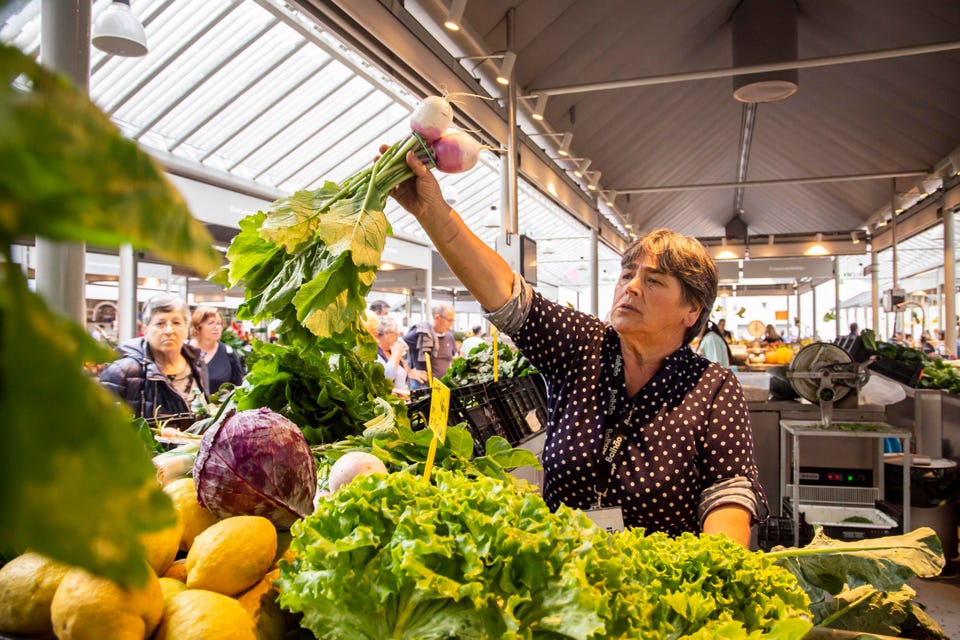Sustainability Journalists Are Making The Same Mistake With Dietary Change They Made With Climate Change: Study Jeff McMahon Senior Contributor Opinions expressed by Forbes Contributors are their own. From Chicago, I write about climate change, green technology, energy. Following New! Follow this author to stay notified about their latest stories.
Got it! Oct 2, 2022, 12:02am EDT | New! Click on the conversation bubble to join the conversation Got it! Share to Facebook Share to Twitter Share to Linkedin There is strong evidence, and little debate, that first-world diets need to shift away from meat and . . .
[+] toward plants, scientists say in a new study. (Photo by Rita Franca/NurPhoto via Getty Images) NurPhoto via Getty Images Scientists agree that developed nations need to eat less meat and shift to a plant-based diet, according to a new study in the journal Sustainability, but newspapers cover the issue as an open debate. Newspaper coverage of dietary change is reminiscent of widely criticised coverage of climate change earlier in this century, the study says, which presented the human causes of global warming as debatable long after scientists had reached consensus.
“There is clear scientific evidence that diets in high-income countries need to shift away from animal-based foods and towards plant-based foods not only to reduce GHGs (greenhouse gases) to address climate change but also to reduce resource use (e. g. , land, water) and pollution,” write the scientists from Maryland’s Towson University and the University of Wisconsin, “but many newspaper journalists are presenting ‘both sides’ and, therefore, covering the issue as an open debate.
” A decade ago, media were often criticized for simplistic “ he said-she said ” reporting, also known as “false balance reporting,” that misled the public about the reality and urgency of climate change. In a separate study this year, Northwestern University researchers recently called it “ bothsidesism . ” MORE FOR YOU Is Carbon Capture Another Fossil Fuel Industry Con? Sustainable Fashion Wants Brands To Redefine Business Growth Trouble With Predicting Future Of Transportation Is That Today Gets In The Way In reporters’ efforts to get the other side, they often turned to representatives of industries vested in greenhouse-gas pollution.
They may have given those industries an opportunity to fool the journalists and their readers and to delay the response to climate change. “Media coverage of climate change commonly used a ‘both sides’ approach for many years, despite clear scientific evidence that human-caused climate change was happening,” the new study recalls, “and the climate deniers quoted in the media often had financial ties to industries that were trying to avoid efforts to address climate change. ” This is happening again in coverage of the needed shift from animal-based foods, the authors say.
“Journalists regularly quote representatives of the U. S. Cattlemen’s Association, who highlight efficiency improvements in beef production and the benefits of responsible grazing and newly termed ‘regenerative’ beef production.
” The team, led by Jillian Fry, an assistant professor of health sciences at Towson, studied 238 articles published between 2018 and 2020 in 29 U. S. newspapers.
They compared coverage of two issues—the need to shift to a more plant-based diet and the need to reduce food waste. They found “a clear distinction in coverage, with FLW (food loss and waste) presented as an issue with broad institutional and political support and diet change presented as more of an individual issue that is subject to controversy among stakeholders. ” To scientists who study the topic, dietary change is no more controversial and no less urgent than food waste, Fry said.
I asked her whether there is as much consensus among scientists on the environmental impacts of diet as there is among climate scientists on the causes of warming. “That is a great question and to my knowledge has not been answered,” she said, “but based on the literature, scientists who study diets, environmental footprints, climate, and/or resource use have been coming to the same conclusion for many years, and the evidence continues to get stronger. There are scientists that work closely with agribusiness who would answer differently, but this is not their expertise.
” Bothsidesism may enable industry representatives to confuse both journalists and consumers. And by presenting dietary shift as an individual choice, the study says, journalists de-emphasize broader levers on change. “Shifting diets is often seen as very personal, even though current dietary patterns are heavily influenced by company decisions and government policies.
This individual, downstream framing is reinforced by current news coverage, placing the burden of action primarily on the individual to consume less meat. Economic shifts associated with a decrease in meat and dairy consumption are framed negatively, and potential solutions, like development of programs to support meat and dairy producers to transition to another type of food production, efforts to force producers to address externalized costs/harms, or taxes on animal products, are not commonly discussed despite growing attention among researchers. ” The study also suggests a path toward more responsible journalism.
The researchers document a shift in the way newspapers have covered climate, noting that it coincides with changes in public perception. “More recently, research has shown that media have moved away from framing climate change as an open debate, quote “climate deniers” less, and frame the positions of ‘climate deniers’ negatively. In addition, climate change is now more often framed in newspapers as a public health issue.
These dramatic shifts occurred in tandem with changing public opinion of climate change, and likely are examples of media coverage influencing and being influenced by dominant public views. ” Follow me on Twitter or LinkedIn . Check out my website .
Jeff McMahon Editorial Standards Print Reprints & Permissions.
From: forbes
URL: https://www.forbes.com/sites/jeffmcmahon/2022/10/02/journalists-are-making-the-same-mistake-with-food-that-they-made-with-climate-change-scientists-say/



